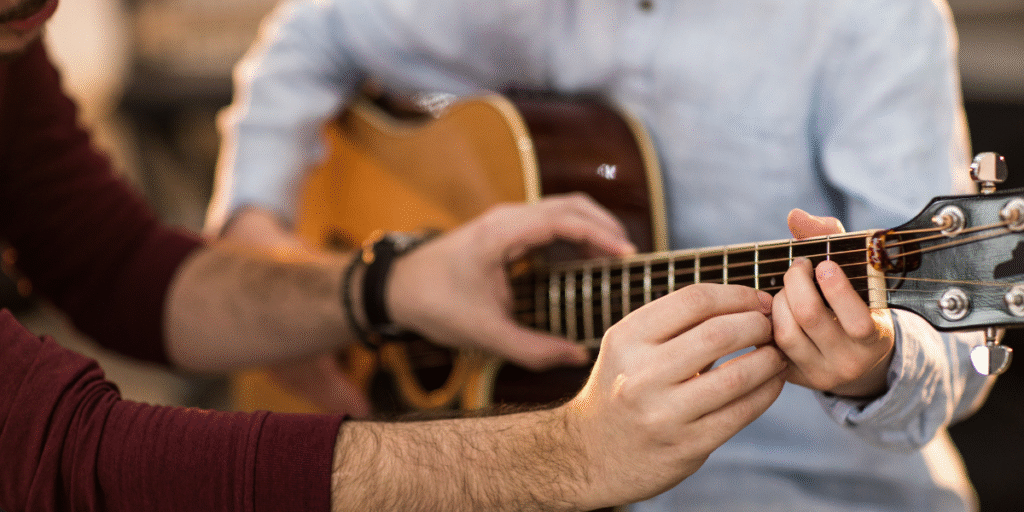How To Get The Most Out Of Your Guitar Lessons
Learning guitar is one of the most exciting and fulfilling musical journeys you can take. Whether you’re a complete beginner or a player looking to level up your skills, taking Guitar Lessons in Toronto can speed up your progress and help you develop proper technique right from the start. But the secret to real success isn’t just attending lessons it’s knowing how to make every session count. Below are the most important factors to ensure you’re getting the maximum value from your investment in music education.

Are You Being Taught Toward Your Personal Goals?
Every student has a different reason for picking up the guitar. Some dream of shredding electric solos, while others want to fingerpick acoustic ballads. You might be interested in songwriting, performing live, or simply learning your favorite songs for fun. Whatever your motivation, your Guitar teacher should shape lesson plans around your personal goals.
Here’s what personalized instruction looks like:
- You get to choose songs or styles you love
- The pace feels comfortable yet challenging
- Lessons adapt as your skills and interests evolve
- Short-term goals and long-term milestones are clear
If you feel like you’re following a “one-size-fits-all” learning method, it may be time to speak up or explore a guitar school that prioritizes individual growth.
Are Performance Opportunities Provided?
Even if the idea of performing makes you nervous, having opportunities to play in front of others is incredibly valuable. Performance helps you:
- Build confidence
- Improve stage presence
- Enhance timing and consistency
- Celebrate your progress
- Develop a musician mindset rather than a hobbyist one
Quality guitar programs offer:
- Student recitals
- Open-mic nights
- Band-style group classes
- Competitions or showcases
When you play live even just once or twice a year you’ll notice faster improvement because you’re working toward a real, rewarding event.
Are Different Perspectives Encouraged?
Music is not rigid. There are many techniques, genres, and ways to interpret songs. A strong learning environment encourages curiosity and creativity. You should feel comfortable asking questions like:
- “Why do we use this chord voicing?”
- “Can I play this rhythm differently?”
- “What happens if I try a different strumming pattern?”
A great guitar teacher doesn’t just show you what to play they help you understand why it works. They may even introduce different perspectives from famous musicians, various cultural music styles, or other instructors within the same school.
When you’re exposed to different ideas, you become a more well-rounded and adaptable musician.
Are Your Teachers Supportive, Qualified, and Experienced?
Your relationship with your teacher has a major impact on your success. The best instructors are:
- Patient and encouraging
- Skilled in technique, theory, and performance
- Experienced with teaching all ages and levels
- Certified or professionally trained
- Passionate about music and student success
A supportive teacher will motivate you through challenges, celebrate your victories, and continuously push you toward progress. If you leave every lesson feeling inspired and excited to practice, you’ve found the right match.
Is High-Quality Equipment Used in the Lessons?
Learning in an inspiring and professional environment matters more than many people realize. High-quality instruments and modern lesson rooms help students:
- Develop better tone
- Hear music more clearly
- Feel more motivated to play
- Practice proper technique with the right gear
When schools maintain well-tuned guitars, amps, and recording tools, students gain experience with equipment used by real performing musicians. This builds confidence and creates a more enjoyable learning experience.
Are There Rewards or a Graded System?
Positive reinforcement can make a huge difference, especially for younger students. A reward system gives students something to aim for, making progress feel fun and exciting.
Different options include:
- Music grading systems or certificates
- Achievement badges or trophies
- Practice charts and progress tracking
- Recognition at recitals or school events
Rewards help students visualize how far they’ve come, keeping motivation high throughout their musical journey.
Is There a Space for Community?
Music brings people together. A strong sense of community keeps students engaged and excited to continue learning. Look for programs that offer:
- Group classes or band programs
- Jam sessions
- Social events for students and families
- Online communities or student groups
When students meet others who share the same passion, guitar lessons feel less like schoolwork and more like joining a creative family. For many, this becomes the highlight of their week.
Conclusion
Your guitar journey should be exciting, rewarding, and personal. The right school will not just teach you songs, they’ll help you grow into a confident musician with real-world skills. When lessons include supportive instructors, performance opportunities, quality equipment, and a sense of community, your progress will skyrocket.
If you’re searching for Guitar Lessons in Toronto, make sure you choose a school that puts your musical goals first. Elite Music Academy offers private and group learning options that help students become true performers while having fun every step of the way.


